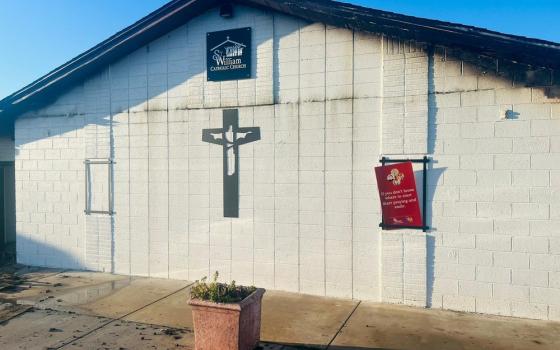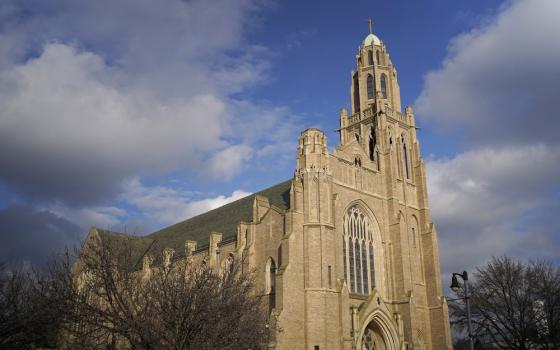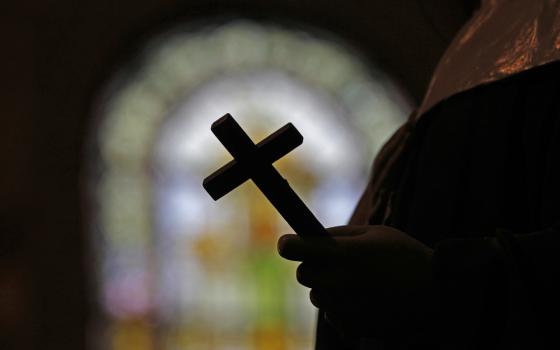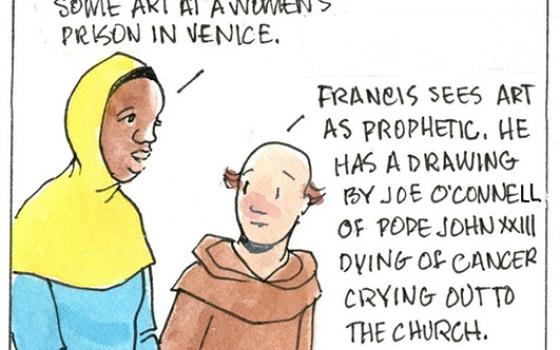A Venezuelan migrant and her child begin the trek through the Darién Gap on Sunday, April 30. The trek across the roadless jungle takes two to three days. (GSR photo/Manuel Rueda)
Jairo Hurtado entered the Darién jungle with all of his belongings stuffed into a backpack. He wore rubber boots to keep his feet dry in the muddy trails, and carried a machete to slash through the dense vegetation and "protect" himself from criminals who sometimes assault migrants walking along the remote trails that connect Colombia with Panama.
As he started the first leg of the three-day long trek, Hurtado, 28, reflected on what had prompted him to take this route.
"I just want to have a more dignified life," said Hurtado, who came from Venezuela and was hoping to make it all the way to the United States. "Inflation is too strong in Venezuela, and we can barely afford to eat."
Every day, around 1,000 people enter the Darién Gap, a dense and roadless swath of jungle that divides South America from Central America. They pay hundreds of dollars to local guides to take them across the rainforest and lead them toward a government-run camp in Panama.
Close to 1,000 people every day make the journey through the dangerous Darién Gap. According to UNICEF, more than 32,500 children have walked through Panama’s jungle in 2022. Half of them were younger than 5 years old.
Embarking from Necoclí
But those who can't afford to pay get stuck for days and weeks in Necoclí, a Colombian seaside town on the southern edge of the Darién Gap, where they are getting help from a group of sisters who have set up a food pantry for migrants at the local community center.
"These migrants are living through all of the challenges and obstacles that the people of Israel went through," said Sr. Juliana Plata of the Congregation of St. John the Evangelist, as she helped to keep a crowd in order. "So, with these meals we nourish them, and also help them save some money so that they can continue their journey."
At the community center in Necoclí, 300 people lined up recently for a free plate of tuna, rice and lentils.
Most of them were migrants from Venezuela who hoped to cross the Darién Gap and reach the U.S., but ran out of money. While the meals are simple, many migrants said the gesture gives them hope.
"God never abandons the poor and the humble," said Ananias Mendoza, a seamstress from Venezuela who arrived in the small town the night before. She carried a plastic water bottle that she had cut in half to use as a food container. "These meals will help us to get by while we get some money sent from our friends or relatives," she said.
Three congregations in Necoclí are currently working with the Apartadó Diocese and humanitarian groups to assist migrants who are stranded and have run out of funds. At the town's community center, in addition to providing daily meals, the aid program also offers help for those who have health problems or need orientation on how to continue their journey.
That includes providing the migrants with information on how to buy their tickets on boats (so that they don't get charged extra) and also connecting those who need medical assistance with organizations like the Red Cross. The migrants can also get some items for their journey, such as mosquito repellent, diapers for the children, soap and water, at a small store set up by UNICEF where everything is free of charge.
St. John the Evangelist Sr. Margaret Pericles serves meals for migrants at the community center in Necoclí, Colombia, April 27. (GSR photo/Manuel Rueda)
"There are families that don't really know this place, or what to do. They don't know where to go next from here or where they can get support," Plata said. "So we try to act as a bridge, between them, and others who can provide help."
This aid program is happening as the corridor that connects South America with Central America experiences a historic surge in the number of migrants and refugees who are trying to reach the U.S.: According to Panama's immigration authority, 166,000 migrants crossed the Darién Gap in the first five months of this year, compared to 109,000 crossings total between 2010 and 2019.
Many of the people who are currently crossing the Darién Gap are Venezuelans fleeing their country's economic crisis, or are migrating for the second time after having given up on finding work in countries like Colombia, Peru or Chile, due to low salaries or increasingly rigid immigration policies.
But there are also thousands of Ecuadoreans fleeing drug violence, and even people from Afghanistan who are escaping the Taliban and have been unable to get visas to fly to the U.S. (Most Afghans who are crossing the Darién Gap start their journey in Brazil, arriving on humanitarian visas.)
#CatholicSisters of Saint John the Evangelist, Franciscans of Mary Immaculate and of the Presentation of Mary help migrants who have run out of funds in Necloclí, by offering them food and guidance for their journey through the #DariénGap.
The jungle's dangers
During the trek across the jungle, migrants risk being robbed by gangs who target them as they walk along remote trails. They must also wade across unpredictable turbulent rivers, where some have drowned.
To reduce these risks, migrants pay for guides to lead them through the rainforest, around $180 for a three-day trek to a government-run camp on the Panamanian side of the jungle, where the road into Central America begins.
"The government is not helping these people, and for us it's a problem to have so many of them here," said Darwin García, a community leader in Capurgana. He said that hundreds of villagers now work as guides, taking the migrants to the top of a mountain that marks the border with Panama. From there, migrants must often find their way to a small hamlet, where boats take them toward the camp where buses are available.
A group of migrants from Venezuela, Haiti and Burkina Faso leave the Colombian village of Capurgana on Sunday, April 30, and start the trek across the Darién Gap. According to the International Organization for Migration, 36 people died in the Darién Gap in 2022. (GSR photo/Manuel Rueda)
"We don't want people to be kidnapped or robbed or get lost in the jungle," García said. "So, what we've done here is to set up a service so that they can get across the jungle as safely as possible."
The U.S. government has responded to this situation by attempting to deter migrants from making the overland journey.
In an April 28 press conference, Homeland Security Secretary Alejandro Majorkas suggested that the number of removals will increase. "Those who arrive at our border and do not have a legal basis to stay will have made the journey often having suffered horrific trauma, and having paid their life savings to smugglers only to be quickly removed," he said.
The Department of Homeland Security also released a statement April 11 that it would launch a 60-day campaign with the governments of Colombia and Panama to reduce the "illegal transit of people and goods" through the Darién Gap. The exact start date of this campaign has not been revealed.
But Katie Tobin, an adviser for the National Security Council said in a press call in April that the U.S. government would provide Colombia and Panama with intelligence to facilitate the arrest and prosecution of "smugglers" who are taking people across the rainforest.
In Necoclí, Plata said she was skeptical over whether these kinds of efforts could succeed. "You can try to shut down the existing routes," she said. "But that will just force people to take even more clandestine paths," when the real issue to address is the tough political and economic situation that they're fleeing in the first place.
The U.S. government also announced that it will open processing centers in Colombia, where migrants can attempt to get visas that will enable them to fly to the U.S., instead of having to make the overland journey. But it is still unclear when these centers will open, and what kind of migrants will be eligible for visas.
In Capurgana, Asdrubal Chirinos, a Venezuelan migrant, said he could not afford to wait any longer. "I have a family to feed," said the 27-year-old father of a 6-month-old son. Chirinos said he worked in Colombia at a pizza shop after leaving Venezuela, making only $9 a day. "Things are getting ugly in Colombia, and it's not sustainable," he said. "I was barely making enough to eat and pay rent."
"I hope that what we are doing can inspire those who are in a position to help, and that the love of God grows in them too."
- Sr. Juliana Plata
Migrants from Venezuela and Haiti get ready to board a boat in Necoclí, Colombia, April 28. (GSR photo/Manuel Rueda)
As migrants continue to travel in large numbers through this area of Colombia, Plata said that her congregation is constantly looking for donors who will help sustain the food pantry in Necoclí.
The food is currently paid for by the Apartadó Diocese, and three congregations take turns staffing it throughout the week, including the sisters of St. John the Evangelist, the Fanciscan Sisters of Mary Immaculate, and the Sisters of the Presentation of Mary.
In the mornings, Plata and Sr. Margaret Pericles, also a member of St. John the Evangelist, walk along the beach in Necoclí speaking with stranded migrants and handing out tickets for the daily meal, which is served at midday.
Plata said that the nuns try to act as a bridge between the migrants and other organizations working in the town to help vulnerable people, such as the Red Cross or the United Nations High Commissioner for Refugees.
Advertisement
"We listen to them and try to provide orientation," Plata said. "Many don't know where to go if they have a health problem, for example, or how they can get a ticket to continue their journey."
She acknowledged that the food pantry only provided temporary relief, but hoped it would be an example for others in the region.
"God's people have always migrated," she said. "I hope that what we are doing can inspire those who are in a position to help, and that the love of God grows in them too."










